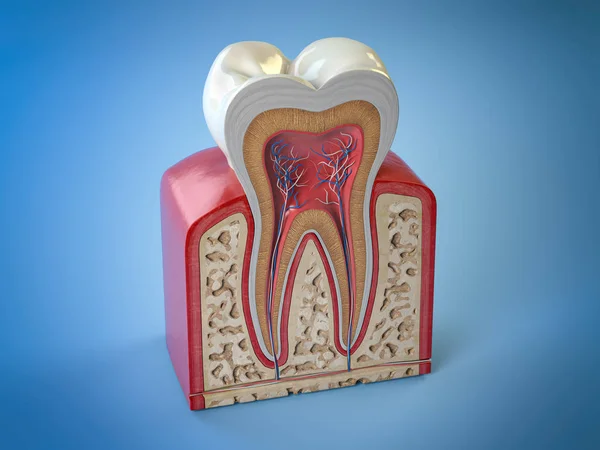Wisdom teeth removal is a common dental procedure, especially among young adults. However, while most surgeries go smoothly, complications such as nerve damage can sometimes occur. If you’ve recently undergone this procedure and are experiencing unusual sensations or numbness, it’s important to understand the possible causes and treatments available.
Table of Contents
ToggleIn this article, we’ll break down everything you need to know about nerve damage after wisdom teeth removal, from causes and symptoms to recovery tips and prevention strategies.
What is Nerve Damage After Wisdom Teeth Removal?
Nerve damage refers to injury or trauma to the nerves located near the extraction site during wisdom teeth removal. These nerves are responsible for sensations in the lips, chin, tongue, and gums. When they are damaged, it can result in temporary or permanent loss of sensation, tingling, or pain.
While nerve injuries are rare, they can be distressing for patients and may require immediate attention. Most cases resolve with time, but in some instances, medical intervention is necessary to restore normal function.
Types of Nerves Affected
Inferior Alveolar Nerve (IAN):
- This nerve runs along the lower jaw and provides sensation to the lower teeth, chin, and lower lip.
- Damage can lead to numbness or tingling in these areas.
Lingual Nerve:
- This nerve is located near the tongue and controls sensations in the tongue and floor of the mouth.
- Injury to this nerve can cause numbness, loss of taste, or tingling in the tongue.
Causes of Nerve Damage During Wisdom Teeth Extraction
Nerve damage during wisdom teeth removal typically results from:
- Proximity of Wisdom Teeth to Nerves: Lower wisdom teeth are often located near major nerves, making them vulnerable to injury.
- Surgical Tools: Drills, scalpels, or forceps may accidentally nick or compress a nerve during extraction.
- Impacted Teeth: Teeth that are partially or fully trapped in the gums may require extensive surgical intervention, increasing the risk of nerve damage.
- Anesthetic Injections: In rare cases, injections used to numb the area may injure the nerve directly.
- Post-Surgical Swelling: Inflammation or hematoma formation can compress nearby nerves, leading to temporary symptoms.
Symptoms of Nerve Damage
Temporary vs. Permanent Symptoms:
- Temporary Symptoms: Typically resolve within a few weeks to months as the nerve heals naturally.
- Permanent Symptoms: May require surgical intervention or therapy if the nerve does not regenerate properly.
Common Sensory Changes Include:
- Numbness: Loss of sensation in the lips, chin, tongue, or gums.
- Tingling or “Pins and Needles” Sensation: Similar to the feeling when a limb “falls asleep.”
- Burning Pain: Unpleasant burning sensations or discomfort in the affected areas.
- Loss of Taste: Particularly if the lingual nerve is affected.
- Weakness in Facial Muscles: In extreme cases, partial paralysis may occur.
Patients should immediately report symptoms to their dentist or oral surgeon, especially if symptoms persist beyond the expected healing period.
Diagnosis of Nerve Damage
Diagnosing nerve damage involves:
- Physical Examination: Dentists assess sensation and movement in the affected areas.
- Patient History: Evaluating when symptoms started and how they have progressed.
- Imaging Tests: X-rays, CT scans, or MRIs may be used to locate the injury.
- Electromyography (EMG): Measures nerve and muscle activity to assess damage.
Early diagnosis plays a vital role in treatment effectiveness, so don’t hesitate to seek professional help if you suspect nerve damage.
Treatment Options for Nerve Damage
Medications:
- Pain Relievers: Over-the-counter painkillers or prescription medications to manage discomfort.
- Anti-Inflammatory Drugs: Help reduce swelling and pressure on nerves.
- Nerve Regeneration Supplements: Such as B-complex vitamins to support nerve repair.
Physical Therapy:
- Desensitization exercises and nerve stimulation therapy can promote healing and restore function.
Surgical Interventions:
- Microsurgery: Repairs severe nerve injuries by reconnecting damaged fibers.
- Nerve Grafts: Used in cases where the nerve is completely severed.
Alternative Therapies:
- Acupuncture: May alleviate pain and stimulate nerve recovery.
- Laser Therapy: Promotes tissue repair and reduces inflammation.
Recovery Process and Timeline
Recovery from nerve damage depends on the severity of the injury:
- Mild Cases: Heal within 4–8 weeks with conservative treatments.
- Moderate Cases: May take 3–6 months and benefit from physical therapy.
- Severe Cases: Could require surgical repair and up to 1 year or more for partial recovery.
Following your dentist’s recommendations and attending follow-up appointments are crucial for a smoother recovery process.
Prevention of Nerve Damage During Surgery
Although nerve damage can’t always be avoided, several steps can reduce the risk:
- Pre-Surgery Imaging: Dentists use advanced imaging to locate nerves and assess risk.
- Experienced Surgeons: Opt for a skilled oral surgeon with a strong track record in wisdom teeth extraction.
- Minimally Invasive Techniques: Smaller incisions and precise tools lower the chance of nerve injury.
- Post-Surgery Care: Managing swelling and inflammation reduces secondary nerve compression.
Risk Factors That Increase the Chances of Nerve Damage
Several factors can increase the likelihood of nerve damage during wisdom teeth removal:
- Age:
- Older patients are more prone to nerve injury because their bones are denser, making extraction more complicated.
- Impacted Wisdom Teeth:
- Teeth that are deeply embedded in the jawbone or gums often require extensive surgery, increasing the risk of nerve trauma.
- Proximity to Nerves:
- Wisdom teeth located near major nerves, such as the inferior alveolar or lingual nerves, present a higher risk.
- Surgical Complexity:
- Procedures involving bone removal, tooth sectioning, or multiple extractions increase the chances of nerve damage.
- Inexperienced Surgeons:
- Less experienced practitioners may be more likely to damage nerves during surgery.
- Pre-existing Conditions:
- Diabetes, autoimmune disorders, or previous facial surgeries may affect nerve sensitivity and healing.
Understanding these risk factors can help patients discuss potential concerns with their dentist or oral surgeon beforehand.
Long-Term Complications of Untreated Nerve Damage
If nerve damage is left untreated, it may lead to several long-term complications:
- Permanent Numbness:
- Loss of sensation in the tongue, lips, or chin can affect speech and eating habits.
- Chronic Pain:
- Persistent burning or tingling sensations, known as neuropathic pain, may develop and require long-term pain management.
- Speech and Eating Difficulties:
- Numbness in the tongue can lead to challenges with speaking clearly and swallowing food properly.
- Psychological Impact:
- Living with chronic symptoms can lead to anxiety, depression, or social withdrawal.
- Altered Taste Perception:
- Damage to the lingual nerve can result in permanent loss or distortion of taste sensations.
Addressing symptoms early can prevent these complications, ensuring better recovery outcomes.
Patient Experiences and Testimonials
Many patients have shared their experiences with nerve damage following wisdom teeth removal. Some describe mild tingling that resolved within weeks, while others report ongoing symptoms requiring medical intervention.
Case Study Example:
- Patient Name: Sarah K.
- Issue: Numbness in lower lip and chin for 6 months post-surgery.
- Treatment: Physical therapy combined with vitamin B12 supplements and low-level laser therapy.
- Outcome: Gradual improvement over 9 months with 80% recovery of sensation.
Hearing real-life stories can provide reassurance and guidance for those facing similar situations.
Legal Aspects and Medical Malpractice
In cases where nerve damage results from negligence, patients may consider legal action:
- Negligence Evaluation:
- Determining whether the oral surgeon followed proper protocols and informed the patient of risks beforehand.
- Medical Records Review:
- X-rays, CT scans, and surgery notes may be analyzed for evidence of malpractice.
- Legal Claims:
- Patients may file claims for compensation to cover medical expenses, lost wages, and emotional distress.
Consulting a legal professional can help clarify whether legal recourse is appropriate in cases of severe, avoidable nerve damage.
Tips for Coping with Nerve Damage Post-Surgery
Living with nerve damage can be challenging, but these strategies may help:
- Maintain Oral Hygiene:
- Keep the area clean to prevent infections that may exacerbate symptoms.
- Pain Management Techniques:
- Use warm compresses and over-the-counter pain relievers to reduce discomfort.
- Dietary Adjustments:
- Opt for soft foods to avoid irritation and promote healing.
- Therapeutic Exercises:
- Practice gentle tongue and jaw movements to stimulate nerve activity.
- Mental Health Support:
- Join support groups or seek counseling to manage emotional stress related to nerve damage.
By focusing on self-care and following professional advice, patients can enhance their recovery process.
When to See a Specialist?
It’s essential to seek medical advice if you experience any of the following after wisdom teeth removal:
- Persistent numbness or tingling lasting longer than 2–4 weeks.
- Sharp or burning pain that worsens over time.
- Difficulty speaking, eating, or swallowing.
- Signs of infection, such as swelling, redness, or pus discharge.
- No improvement after initial treatments like medications or physical therapy.
Specialists such as oral surgeons, neurologists, and pain management doctors can provide advanced treatment options for long-term nerve issues.
Conclusion
Nerve damage after wisdom teeth removal, while rare, can significantly impact daily life. Early detection, proper treatment, and ongoing care are crucial for recovery. Patients should openly discuss potential risks with their surgeon before the procedure and monitor symptoms closely post-surgery.
Whether the symptoms are temporary or require long-term management, understanding the condition empowers patients to make informed decisions and seek timely medical intervention.












